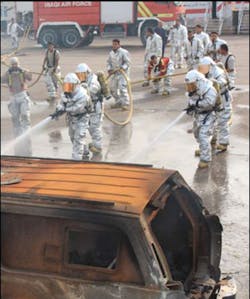Iraqi National Fire Academy 'Training Trainers'
Firefighters have an extreme occupation. They rely on their comrades for their lives, and because of this they bond on a level where they share their knowledge and experience freely.
From the beginning, extreme circumstances surrounded Maj. David Melendez's career as a fireman.
During the tragedy of 9/11, he was an emergency medical technician awaiting his opportunity to train as New York City firefighter. His chance came a month later when he began the fire academy in the shadow of his fellow firefighters' loss.
His entrance into the brotherhood of firefighters was a bittersweet moment. Now, for the second time, his opportunity to train as a fireman comes from extreme circumstances. His deployment to Baghdad in support of Operation Iraqi Freedom (OIF) allowed him to begin fire training again, but this time as one of the organizers at a unique academy. His own touchstone moment arrived, to share what he knew with fellow Iraqi firefighters.
"We are developing a course for the Iraqis to become internationally certified. In the past, they had a basic two-week course and they would have to go other places, like Bahrain; so a lot of these guys already know a lot," Melendez said.
Most of the 20 Iraqi firefighters from the Ministry of Defense and Ministry of Interior's Civil Defense Force are already experienced fireman, so the focus of this course is to train them to be proficient trainers themselves. In Army lingo, this is "train the trainers" at its best.
"Some of the guys are Army, some Air Force. They can go back to their stations throughout Iraq and teach their fire company, and then here in the Civil Defense (facility) we are trying to develop a core curriculum so that everyone knows what to teach," said Melendez.
"Being a firefighter -- it is not about yourself, it is a collective team, a kind of brotherhood."
The Multi-National Security Transition Command Iraq (MNSTC-I) Coalition Air Force Training Team fire rescue advisors, Tech. Sgt. Brian Partido and Tech. Sgt. Luis Ortiz- Acevedo, were previously conducting a fire school in Taji when Melendez's predecessor saw them on television. After meeting them during the unit's relief in place (RIP) Melendez had them moved to the IZ academy. The two found that what they lacked in equipment was solved by moving to the IZ academy.
"This is state-of-the art training. This place, the National Fire Academy, is like it was always meant to be here in Baghdad. To make this training work, we had equipment they (Iraqis) didn't have. And the Iraqi firefighters had equipment we didn't have," said Partido, lead instructor for the training. "We took the fire apprentice course from the US Air Force and adapted it to the way Iraqi firefighters operate and had it translated into Arabic," he said of the new 60-day block of instruction.
"It doesn't matter where you come from around the world, fire- fighters are truly a brotherhood when it comes to professionalism and the spirit of healthy competition," said Ortiz-Acevedo, a Puerto Rico native.
Iraqi Army Cpl. Akram Huseen Ali, previously chosen to train as a Humvee driver instructor, said he likes his new job because he wants to help people. "Before, I didn't know anything about firefighting, I had no background." Now he is grateful for this opportunity, the friends he has made and the training from the American instructors. He said in his heart he is now a firefighter.
The classroom instruction includes six subjects ranging from medical to basic fire knowledge, fire principles, advancing to fire control, hazardous materials, and structural training and aircraft fires. Partido has also noticed the willingness to share between the Iraqi students.
"They have different levels of experience, ranging from guys that have never been a firefighter all the way up to gentlemen who have been in for over 20 years. It is good to get the input from the older guys helping to teach the younger guys," Partido remarked. "I think they will be excellent. We started from the basics and worked our way to the more advanced techniques and it's amazing to see how far they have come."
"It is great to be involved at this level, and to be able to work with both the Ministry of Defense and the Ministry of Interior is very challenging yet rewarding. I wouldn't have missed it for the world," Partido reflected. "They have great hearts and they're enthusiastic about what they're doing and they love being firefighters. We try not to instill any American principles in them, we give them the logic behind why we wanted to become firefighters, how we would like to help people, and take care of others and put our lives on the line."
Though new to fire fighting, Akram found this to be true for himself. "Most of (the students) I didn't know, but now they have become like my brothers; if anything happens to them it is like it is happening to me."
As for the bond between this diverse collection of firefighters, Melendez summed it up best: "We all speak the language of putting the wet stuff on the red stuff." Republished with permission of In The Zone Magazine.
